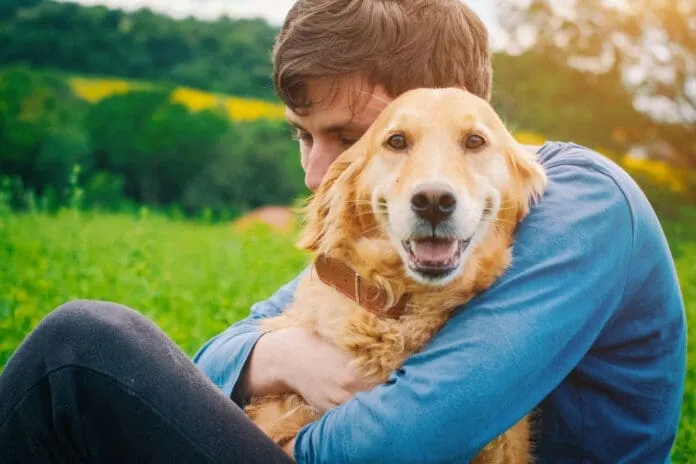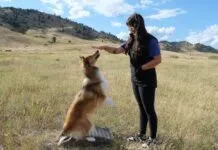I don’t know about you, but I’ll freely admit I can’t speak dog or read a dog’s mind. If I could, I might be able to answer that question—and whole lot of others!—with authority. However, since we can never fully know the answer to why dogs sometimes sit on our feet or laps, we have to look to what experts understand about dog psychology.
Back in the late 20th century, people—and even trainers—believed that this kind of dog-sitting-on-us behavior was related to the dog’s desire to assert their dominance over humans. This idea arose from earlier studies of captive wolves in zoos, where packs were dominated, often violently, by a single wolf. Investigators then applied this dominance theory to wolves in the wild, and eventually to the family dog.
Luckily, science has now roundly dismissed this dominance theory as, in a word, bunk.
So, if your dog isn’t trying to dominate you by sitting on your feet or cuddling with you, what’s going on?
They Want Social Interaction
We know that dogs are social animals who have evolved to have close, affectionate relationships with humans, especially those who make up their human family. They show that affection through actions like licking (“dog kisses”), wagging their tails and wriggling their body, encouraging petting, ear-scratching, or belly-rubbing, and generally inviting physical contact with humans.
Veterinary Behaviorist and member of the Royal College of Veterinary Surgeons Sagi Denenberg explains that a dog’s relationship with humans is related to attachment, not flawed theories of hierarchy or domination. That need for social connection drives much of dog behavior, from the desire to follow their caretakers around the house, to wanting to sit on their feet or lap.
“Often when dogs sit on our feet, it’s because they want to be close to us,” says Dr. Mary Burch, a certified applied animal behaviorist and director of the AKC Canine Good Citizen Program. “It’s one way a dog shows affection. Think of your dog sitting on your feet as the canine version of a hug or cuddle.”
This can apply to people outside the dog’s immediate human family as well: thanks to the tens of thousands of years they’ve been living with us, dogs have become acutely tuned to our emotions, which includes recognizing when we’re with people we like or care about. That means your dog may end up on the feet—or laps—of close friends and neighbors that are spending time in your home.
They Want Safety and Reassurance
Sometimes, your dog may feel the need for extra safety or reassurance. Maybe he heard gunshots, fireworks, or thunder. Maybe there was a strange dog outside. Maybe someone came in who looks different (perhaps a man with a beard or wearing a hat). Maybe it was a child, whom the dog has never been exposed to. My last dog Joey was struck with terror when he first met my kind and gentle brother, who wore a long beard and a hat.
Unfamiliar locations—your new house, a hotel room, or someone else’s home—and situations can also cause stress and anxiety, which often triggers the dog’s need to be physically close because he feels unsure and insecure. On the other hand, if your dog suddenly plops down on your feet when she’s never done it before, you might want to try figuring out if something’s distressing her.
Dogs can also “claim” their caretaker when they sense a need to protect them. It can be something as simple as that strange man with the hat, whom your dog sees as a threat. Sometimes a dog’s protectiveness has its roots in jealousy: for instance, your pup climbs onto your lap and tries to put himself between you and the person who sits down on the couch next to you. (It’s important to distinguish between a dog being protective and exhibiting protective aggression.)
They Want Rewards
Whether your dog is lolling on your feet or sprawled in your lap, you’re probably petting them, or kneading their ears, or scratching them under the chin, or just talking to them. In the dog’s mind, you’re rewarding them for doing what they’re doing, which is the definition of positive reinforcement.
Through your actions, you’re letting your dog know that his behavior is a good thing…which guarantees he’ll continue with that behavior to get what he wants: your attention!
In the end, there’s no single, definitive answer to why your dog likes to sit on you, whether it’s in your lap or on your chest or your feet. (My take has always been that since a dog’s sense of smell is so much keener than ours, one of the reasons they choose to lie on our feet is because our feet contain so many wonderful smells from places we’ve been!) One thing you can be sure of, however, is that your dog isn’t trying to be the “alpha” or “pack leader.”
Maybe the real answer is that they’re just being a dog!








